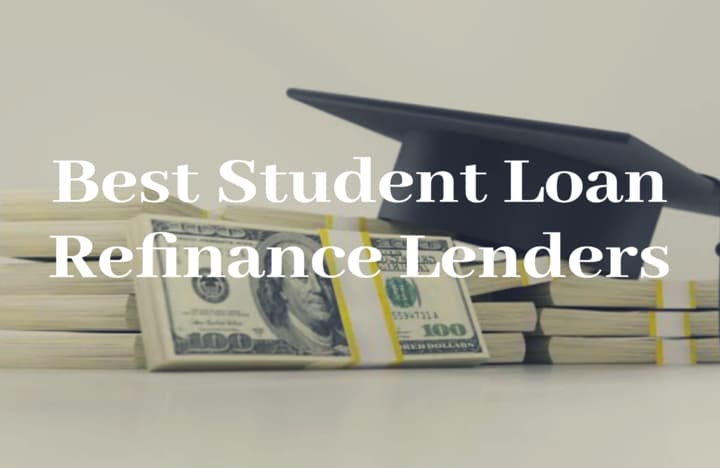Oftentimes, student loans are accompanied by the promise for the future, loans backed by the government, and very high-interest rates. And when you start working and repaying your loan every month, it will be useful to consider some things. This is why you should look at the best student loan refinance lenders.
You can refinance your loan for better terms and lower rates. You can also consolidate multiple loans into one single monthly payment. This way you can save money by repaying in lesser years or reducing your rates significantly. Through refinancing, you can also release a cosigner from your loan.
Browse through this list of some of the best companies in the industry and ascertain the ones that offer the services.
1. LendKey
You can make your finances simpler with flexible loan terms

With LendKey, you can refinance your loan using a single platform. This platform lets you search, customize, and finance your loan through its network of banks and credit unions.
LendKey connects you with both federal and private student loan refinancing services. This way, you can have just one simple monthly payment to make.
The platform also has a student loan calculator that checks how much money you can save from different terms and rates. It also has an educational section that guides you on how to manage money, refinance your loans, and setting up your future. It has an amazing Trustpilot rating and many positive customer reviews.
Pros
- There are competitive rates and excellent incentives
- You can consolidate loans into an affordable payment
Cons
- Its comparison tool lacks information on lenders
- It’s also not a direct lender
2. SoFi
A quick and simple online platform
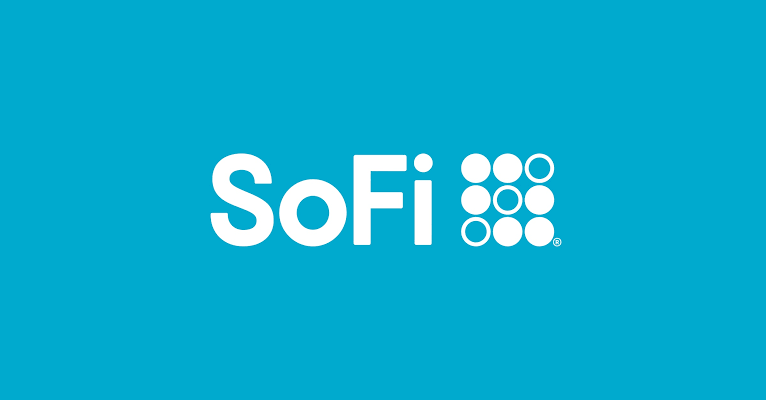
SoFi is one of the top student loan refinancing companies. It has financed more than $18 billion for well over 300,000 people with excellent customer reviews. The process is simple: you will be pre-qualified online and SoFi tells you whether you’ve qualified before the final application.
Then you can choose the rate and term you prefer, and also choose either saving on your monthly payment or saving on your total interest. After that, you will upload screenshots of your financial documents and sign the final document online. Your old loan can now be paid off and you can be issued a new loan.
It’s also possible for you to refinance unsubsidized direct loans, graduate PLUS loans as well as private student loans. It’s best for those students who graduated from a Title IV university or a graduate program.
If you are employed, have a substantial income from another source other than your employer, or if you have a good financial history, then you are eligible to apply. SoFi has a wonderful rating on Trustpilot, and its customer support is always available.
Pros
- It offers protection against unemployment
- You can use a cosigner to refinance loans
Cons
- Its shortest loan term is 5 years
- Consolidation does not take into account other government benefits
3. College Ave
A quick, three-minute application
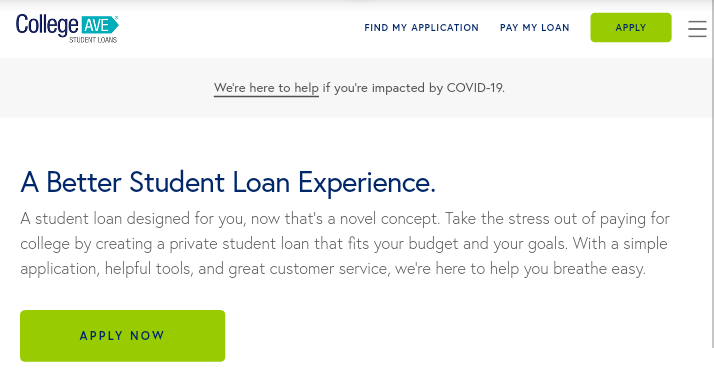
This company promises that not only will it significantly reduce your monthly payments, it will also reduce your stress level. And it is quite possible to reduce the total cost of your loan with fixed or variable rates, no origination fees, and no 0.25% autopay discount. Its application process takes about 3 minutes and many types of borrowers are welcome.
College Ave allows refinancing from $5,000, quite unlike many other lenders. This makes it possible to offer flexible terms and loan amounts as there are 16 options to pick from. It is also accredited by the Better Business Bureau and has a rating of A+.
Pros
- It offers high maximum loan amounts
- There are no application or origination fees
Cons
- There is little clear information about income requirements
- You can lose your federal program benefits
4. Credible
There are competitive personal offers from many lenders
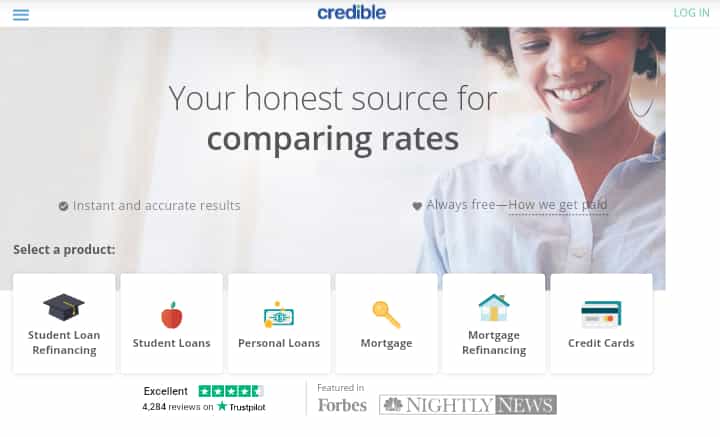
This company is a well-known marketplace for loans. It offers student loan refinancing, private student loans, personal loans, mortgages, and credit cards. Credible provides an easy online form you’ll fill out depending on the type of loan you want, and your information is secure.
After filling out the form, you’ll receive personalized rates from up to 10 lenders in 2 minutes. And if you find it hard to make a choice, the customer support team is available to assist you.
With Credible, you can refinance federal, private, and Parent PLUS loans. That way you can lower your interest rate, reduce your monthly payment, reduce your loan term, or release a cosigner from your original loans. This company has been featured by top financial platforms like Forbes, Wall Street Journal, and NBC Nightly News. It also has a rating of 9.5/10 on Trustpilot.
Credible is so sure that it’s the best marketplace that it offers you $200 if you find lower rates elsewhere. And after your application, you’ll get a final offer in about one business day. With that, you can pay off your loans in terms ranging from 5 to 20 years.
Pros
- It offers incredibly low rates
- It’s a marketplace of lenders who are competing for your loan
Cons
- It is very difficult to find loan rates and terms on the site
- It is not a direct lender
5. Laurel Road
A lending technology to build your loan

Using Laurel Road’s online loans platform, you can check the rate of your student loan refinance in less than 5 minutes. It also offers graduate school loans, mortgages, and personal loans. Therefore, you can also make use of its other services if the need arises.
Laurel Road is available in all 50 states and charges zero application or prepayment fees. You can also talk to your employer about Laurel Road as it offers employee benefits partners with amazing benefits.
Laurel Road also refinances Parent PLUS loans too. This means that you should consider a better rate for your loan when your child is done with college. They also have a referral program that pays you $400 when you refer a friend.
Pros
- It charges low fixed and variable rates
- It can work with both private and government refinancing
Cons
- You must have a good to excellent credit only
- It’s underwriting requirements are unclear
6. Earnest
Choose a payment plan that suits your budget

When you refinance with Earnest, you can consolidate your different education loans into a single lower interest loan. And there is no origination fee charged. Also, you can select between fixed and variable rates.
You can equally make use of your improved credit since you took out the initial loans to qualify for lower rates. Earnest also offers an additional rate discount of 0.25% if you sign up for autopay.
During your application, your financial status is checked not just by your credit score. Then you’ll receive a quick estimated rate quote, with the final rate shown after your application has been approved.
The application process also checks other factors concerning your financial life like your job history, savings, and education. This allows you to get much lower rates even if you don’t have much credit.
When your application is approved, you can set your monthly payment based on your budget using the Precision Pricing loan terms. You can set it at 1 to 3-month intervals between 5 to 20 years. This means that you have 180 options for you to finish repaying your loan. With this system, it’s possible to skip one payment a year and still make it up later.
Pros
- Earnest offers a number of flexible repayment options
- Its Precision Pricing model lets borrowers have a greater flexibility
Cons
- You cannot apply with a cosigner
- There is a lack of informative and educational resources
7. CommonBond
Helps you to simplify your student loans and save money

This company starts with a quiz, asking you questions to determine your financial lifestyle. It asks questions like what your main financial goals are, the things you want to change about your current student loans, the amount you think you owe.
Other questions include: how long you have until payoff, the number of lenders you pay monthly and what your average interest rate is.
Then you’ll get results which will be an estimate of how much you can save when you refinance your loan with CommonBond. This is usually based on a 10-year loan with the lowest offered fixed rates.
CommonBond promises a monthly payment that suits your budget, with a timeline ranging from 5 and 20 years and no prepayment fees.
CommonBond also serves a special social service. It is in partnership with Pencils of Promise and helps to fund education in Ghana. For every loan funded, a child’s education is being taken care of in Ghana. This means that your student loans can take care of more than just your education.
Pros
- There are long repayment terms
- It charges no origination fee or prepayment penalties
- It serves a strong social mission
Cons
- It has no repayment plan that is shorter than 5 years
- Requires co-signer for most loans
- Not available in all states
8. SuperMoney
You can get the lowest rates from competing lenders
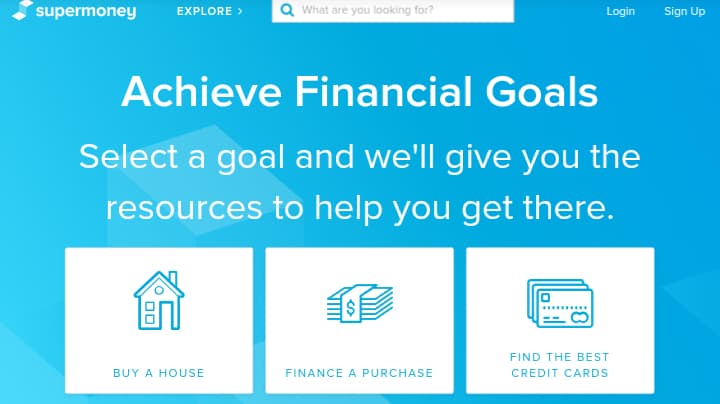
SuperMoney allows you to compare offers from different lenders and find the best one. It has a vast network of lenders and has given loans up to $300,000.
The application process is entirely free and you just have to fill out some questions about yourself. Other questions include the amount you want to refinance and the current terms of your loan.
After that, it’s just to receive your money. Get the new loan and start repaying your loans at a much lower rate. You can also qualify for lower rates and save money on different kinds of loans if you have a good credit history.
Also, you don’t have to be bothered about receiving a lot of sales calls like some other loan comparison platforms. This is because SuperMoney works with lenders directly. Also, you can be assured of the security of your data, and you can be pre-approved on the SuperMoney website.
Pros
- The website has a great user experience
- You can compare multiple lenders with one form
Cons
- It is not a direct lender
- You have to share your details to get rates
9. Education Loan Finance
Has a no-fee application process
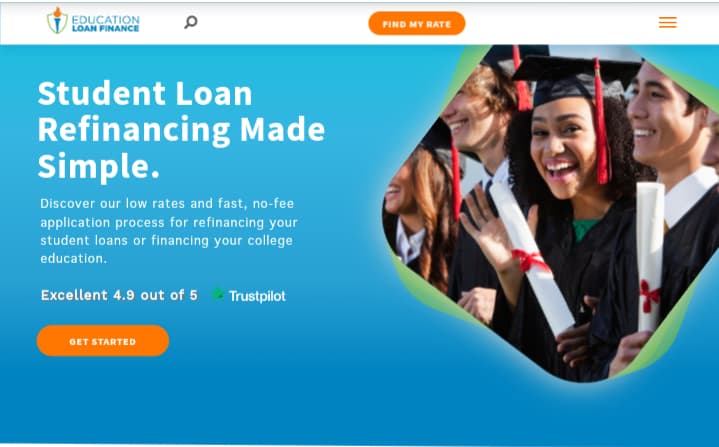
Education Loan Finance (ELFI) offers loans with low fixed or variable rates for people with a student loan debt of $15,000 or more. You can pre-qualify for a loan within minutes.
ELFI offers refinancing for student and parent loans. With it, you can release a cosigner from an original loan. ELFI lets you see your quote within minutes, and if the details, you can then apply online.
Immediately after you’ve submitted your application, you can send in your documents as screenshots or good photos and sign everything online. The terms for the parent and refinance loans for private student loans are 5, 7, and 10 years. That of government loans can get up to 20 years.
Pros
- It offers a variety of plans for different budgets
- There is a seamless application and verification process
- There are Personal Loan Advisors provided
Cons
- There is a high minimum loan amount
- Consolidation does not take into account federal loan forgiveness
10. Splash Financial
Provides more freedom to hardworking graduates
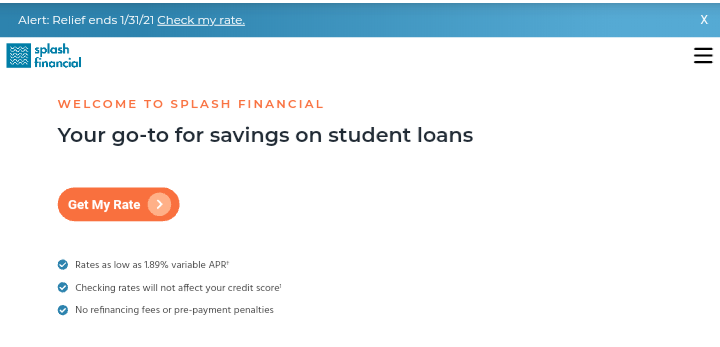
This company has a mission to help students move ahead and “make a splash in the world”. The application process begins with a rate estimate that doesn’t affect your credit score. It takes just about 3 minutes and 3 questions to complete. And when you submit a full application, you can now secure your new rate and lock it. This, however, has a hard credit pull.
Immediately you’ve been approved and are okay with your loan terms, just start your loan, make payments, and start saving your money and time. This company has a 95% rating on customer satisfaction and has a great reputation for customer service as well as a referral program.
Splash has a goal of making students debt-free so they can have a good financial life and pursue their goals.
Pros
- It charges low fixed-interest rates and also saves you money
- There are no application fees and no prepayment penalties
- It boasts of a reliable financial backing
Cons
- It has a high credit requirement
- If you refinance your loan, you may be disqualified from loan forgiveness
Frequently Asked Questions
1. Which companies have the best student loan refinance rates?
These three companies: CommonBond, Earnest, and Credible offer some of the lowest refinance rates currently, ranging from 3.21% to 4.25% respectively.
2. Is it advisable to refinance student loans?
When you refinance your student loan, it can help you to get a much lower interest rate. This helps to reduce the time you’ll spend repaying the loan in your lifetime.
3. What is the amount of credit score do you need to refinance student loans?
It varies with each lender. Some lenders are low-credit score companies, and they accept fair to poor credit scores. Others, however, may require a credit score up to 600 and above.
4. Student Loan Refinancing: What is it?
This process involves the replacement of one or more student loans with a new one. This new one has better terms and it is usually from a private lender.
Most kinds of loans can be refinanced depending on the lender. You can refinance your private and federal student loans, including Parent PLUS loans. The main reason for refinancing a loan is to obtain a lower interest rate and reduce the monthly payments’ lifetime costs.
Banks, online loan providers, and credit unions all offer student loan refinance loans. If you have a federal loan, you can consolidate (instead of refinancing) your debts. Consolidation means bringing different federal loans into a single loan with a simple monthly payment.
Below, there is a sample of student loan refinance rates as compared to the rates for first-time private and federal student loans.
The Refinance section indicates the lowest rates advertised by each lender. While the First-Time section indicates the fixed rates for federal loans and the lowest rates from private lenders. As you can see, the refinance APRs are much lower, which saves borrowers lots of money over the course of their loan.
Refinanced Student Loans
- 1.99% Variable / 2.95% Fixed (LendKey)
- 1.99% (with 0.25% autopay discount) Variable / 2.98% (with 0.25% autopay discount) Fixed (Earnest)
- 2.24% (with autopay) Variable / 2.99% (with autopay) Fixed (SoFi)
- 1.89% Variable / 2.63% Fixed (Splash Financial)
- 1.97% Variable / 2.83% Fixed (CommonBond)
First-Time Student Loans
- 5.05% (Federal Stafford Subsidized Loan)
- 5.05% (Federal Stafford Unsubsidized Loan)
- 5% (Federal Perkins Loan)
- 7.08% (Parent PLUS Loan)
- 3.11% (Private loans, SoFi)
5. How Do I Select the Best Student Loan Refinance Company?
Know the reason you want to refinance.
If you’re looking at saving money on your total loan, then look for a lender with the lowest APR. And if you’re looking at a lower monthly payment, then you may have to pay more in the long run and extend the duration of the loan. In addition, you should look for a lender who offers the payment plan you can afford.
If your goal is to refinance a home Parent PLUS loan, you need a lender who offers that. Each lender has a list of services it offers, therefore you have to find the one who offers what you want, with the best terms for you.
Look at reputation. A good lender should have a strong reputation for having a quick response time, being understandable and secure. Some lenders have better customer relations than others, therefore if you like to contact your lender frequently, look for that. A good lender shouldn’t give your data to any other party and your finances should be secured.
Compare lender flexibility. When you refinance federal student loans, you forfeit your rights to certain income-based repayment plans and loan forgiveness. You should also check what the private lenders have to offer. Can you defer your loans during a period of unemployment? Will you be able to skip a payment? Can you refinance another time if you want?
When you determine that your refinancing savings will far outweigh the benefits of a federal loan, then you should consider refinancing your loan. But it is important to know the terms of each lender.
6. When Should I Refinance Student Loans (or Not)?
As I have already mentioned, sometimes it’s good to refinance a student loan. When you graduate from college and you’ve built an excellent credit score, then you stand a chance of getting a lower interest rate that can save you thousands of dollars on your overall loan amount.
Things to take into consideration before refinancing:
Interest rate. Some loan providers have a lower interest rate than others. You should make sure that the chosen lender can save you some money.
Credit score. If you have a student debt, it’s possible to refinance at a much lower rate, as long as you have a good credit score and a source of income. If you have a bad credit score, however, it will be more difficult to get a reduced rate. Try to wait till you have a better credit score, while you continue to pay off your original student loans in a timely way.
Term duration. When you refinance your loan at a lower rate, but with a much longer loan, your monthly payments will decrease. But you may have to pay more overall because of accumulating interest.
Remaining debt. If you just graduated and have a lot of debt, then you should consider refinancing. However, if you have paid off most of your loan, then you shouldn’t try to refinance.
Yes, you can save a little money. But applying for a refinance can affect your credit score. This can be damaging if you’re also considering another type of loan.
7. What are the Pros and Cons of Student Loan Refinancing?
Pros
- You can potentially save a lot of money
- You’ll have reduced monthly payments to make
- One single payment is a lot easier to make
- You can pay off your loan faster
- Can get more flexible repayment terms
- You have the option to drop your cosigner
Cons
- With a longer-term, you may pay more in the long run
- Applying for refinancing can affect your credit score
- If you refinance a federal loan, you forfeit your government benefits
8. What are the Requirements for Student Loan Refinancing?
Different lenders have different eligibility requirements, but the following are all standard requirements for most refinance loans:
- US citizen or permanent resident
- Age 18 years or older
- Reside in a state where your chosen lender is authorized to lend
- Have employment, sufficient income from other sources, or have an offer of employment starting within the next 3 months
- Have graduated with an undergraduate degree or higher from a Title IV school that’s eligible to process federal student loans.
Lenders also check the following:
Credit. This involves a rigorous credit check which temporarily affects your credit score. Your credit history is the most important element in deciding your interest rate.
Income. Your lender will want to see your payslips or other proof of your sources of income. This is necessary to assess whether or not you have enough monthly cash flow to meet your monthly payments.
Savings. Additionally, your level of savings will also assist the lender in assessing your ability to make monthly payments.
Debt amount. The amount of remaining debt will assist the loan provider in ascertaining the rate and term period of your loan.
9. How Do I Refinance a Student Loan?
Just like other loan or refinance applications, a student loan refinance application involves the following:
Checking your credit
The top credit agencies like Equifax, Experian, and TransUnion are legally taxed with sharing your credit history with you once every 12 months upon request without any charges. Generally, a credit score of 700 or more is considered good, and between 620-700 is average.
Comparing lenders
You can make use of loan marketplaces to compare loan options from different lenders or receive a quote from a direct lender.
Applying for your refinance
You’ll be required to provide some documents such as a driver’s license or state ID, Social Security number, payslips, and employment information.
Refinancing Student Loans with a Cosigner
Pros
- There is a higher chance of approval
- You can reduce the interest rate if the cosigner has good credit
- You can release the cosigner at the predetermined future date
Cons
- The cosigner would have to take on a liability
- There would be some damages to the cosigner’s credit score if there are missed payments
- There could also be potential damage to the relationship with a cosigner over finances
A co-signer can be a:
- Parent
- Guardian
- Spouse
- Close friend
- Relative
- Anyone else who is in a strong financial position and is willing to share the liability for your debts
In lots of cases, fresh graduates do not have the credit history or enough income to get approval for a student loan refinancing unless they have a cosigner. When you bring a cosigner with an excellent credit, it’s easier to get the lender to approve the refinance loan and offer a lower interest rate.
Also, if you bring a cosigner, there would be more documents to sign than when you apply alone. The loan provider will require documentation from both the primary borrower and the cosigner. Then there will be a credit inquiry for both people.
Also, it will probably be tough to get a cosigner, as not everyone would want to share your financial liability. But if your parent, relative, or close friend agrees to be your cosigner, you can sweeten the deal by promising to release them in the future.
For instance, a standard student loan lasts from 5 years to more than 20 years. If you want to take out a 20-year loan, but know you’ll have much better credit in about 5 years, you can state in your loan agreement that you’ll release your cosigner in 5 years.
Then after 5 years, you have to prove to the lender that your credit is now stronger and that your income is enough to pay off your loan.
Alternatives to Refinancing
For those who have private student loans or private and federal loans, the best option could be to refinance your loans. However, for those who only have federal loans, it’s better to consolidate your loans or go for any of the federal government’s loan forgiveness or cancellation programs.
But if you can’t meet the minimum payments, there are some programs for being forgiven all or some of your loan amount:
- Public Service Loan Forgiveness. This is specifically for employees of federal, state, or local government organizations, and some non-profits.
- Teacher Loan Forgiveness. This is for people who have been teaching full-time in a low-income school or educational service agency for at least 5 consecutive years.
- Perkins Loan Cancellation. This is for teachers teaching in low-income schools or children with certain disabilities. It is also available to teachers of math, science, foreign languages, or other fields that have a short supply of qualified teachers.
- Special Circumstances. A student’s debt may also be canceled in the event of a disability, death, bankruptcy, closure of a school, withdrawal from said school, or if the school had falsely certified the student’s eligibility for the loan.
Summary
There is a lot of risk and reward involved in student loans. For the majority of the students, this risk is in the form of taking out tens of thousands of dollars in loans when we’re young, yet to be employed, and have no credit history. On the other hand, there is a reward in the form of having to graduate and getting a good job.
Thankfully, there are now ways to reduce or cancel out your debt payments with better interest rates and loan terms. A lot of students do qualify for loan forgiveness or cancellation. However, if you don’t qualify for these, you can apply for student loan refinancing and save lots of money as a result.
